How Often Should You Get Ultherapy in Memphis?
Ultherapy, a non-invasive ultrasound treatment, has gained popularity in Memphis for its ability to lift and tighten the skin on the face, neck, and chest. This treatment uses focused ultrasound energy to stimulate collagen production, which helps to improve the skin's texture and firmness over time. However, one common question among potential clients is how often they should undergo Ultherapy to maintain its benefits.

Understanding Ultherapy
Ultherapy is a unique treatment that differs from traditional facelifts or injectables. It targets the deeper layers of the skin without causing damage to the surface. The ultrasound energy heats the tissue, prompting the body to produce new collagen and elastin, which are essential for maintaining skin elasticity and firmness. The results of Ultherapy are not immediate; they develop gradually over 2-3 months as the collagen-building process takes place.
Frequency of Treatments
The frequency of Ultherapy treatments depends on several factors, including the individual's skin condition, age, and the degree of skin laxity. Typically, a single Ultherapy session is recommended to start. This initial treatment is designed to trigger the body's natural collagen production process. For most people, the effects of Ultherapy can last up to a year or more. However, as the skin continues to age and collagen production naturally declines, additional treatments may be necessary to maintain the desired results.
Personalized Treatment Plans
It's important to note that each individual's response to Ultherapy can vary. Therefore, a personalized treatment plan is often recommended. During a consultation with a qualified practitioner in Memphis, factors such as your skin type, lifestyle, and aesthetic goals will be considered to determine the optimal treatment frequency. Some individuals may benefit from annual maintenance treatments, while others might find that they need treatments every 18-24 months.
Combining Ultherapy with Other Treatments
Ultherapy can also be combined with other cosmetic treatments to enhance its effects and address multiple skin concerns. For example, combining Ultherapy with dermal fillers or Botox can provide a more comprehensive approach to facial rejuvenation. Discussing potential combinations with your practitioner can help tailor a treatment plan that meets your specific needs and goals.
Longevity of Results
The longevity of Ultherapy results is influenced by several factors, including genetic makeup, lifestyle, and environmental factors. Maintaining a healthy lifestyle, including proper skincare, sun protection, and a balanced diet, can help prolong the effects of Ultherapy. Regular follow-up treatments can also ensure that the skin remains firm and youthful over time.
FAQ
Q: How long does it take to see results from Ultherapy?
A: Results from Ultherapy are not immediate. Most people start to notice improvements in their skin's texture and firmness after 2-3 months as the collagen-building process takes place.
Q: Is Ultherapy painful?
A: Ultherapy is generally well-tolerated. Some patients may experience mild discomfort during the treatment, but this is usually manageable with the use of a numbing cream or pain medication.
Q: Can Ultherapy be used on all skin types?
A: Yes, Ultherapy can be safely used on all skin types. It is a versatile treatment that can address various skin concerns and is suitable for individuals of different ages and skin tones.
Q: How long does an Ultherapy session last?
A: An Ultherapy session typically lasts between 60-90 minutes, depending on the areas being treated. The duration can vary based on the individual's specific needs and the extent of the treatment area.
In conclusion, the frequency of Ultherapy treatments in Memphis should be determined based on individual needs and goals. Consulting with a qualified practitioner can help create a personalized treatment plan that ensures optimal results and longevity. By understanding the factors that influence the effectiveness of Ultherapy, individuals can make informed decisions about their skincare regimen and maintain a youthful, vibrant appearance.




